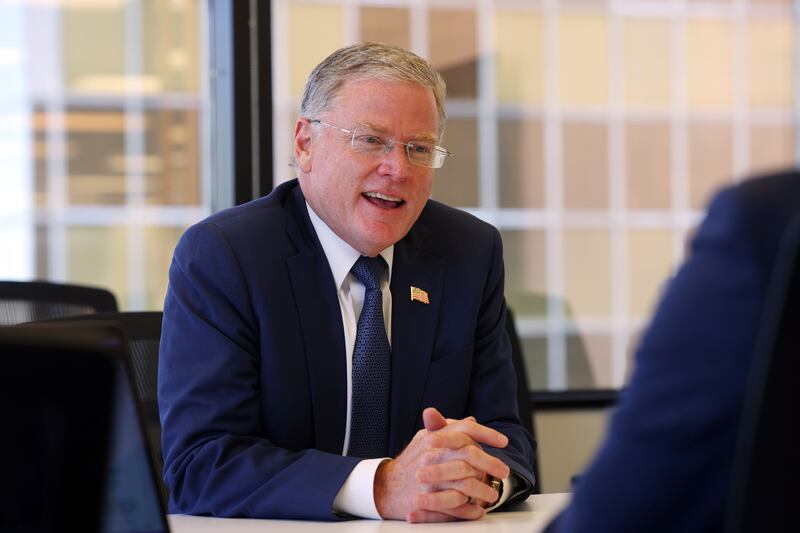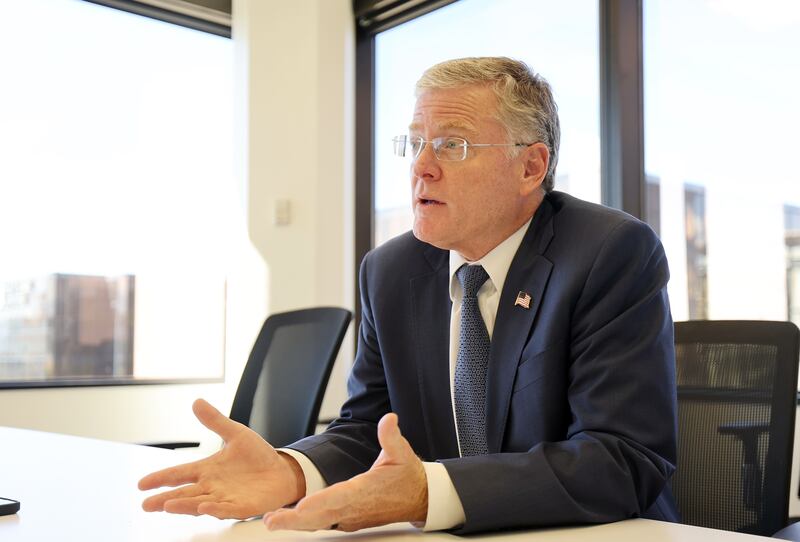Massachusetts’ voters have come to rely on the fiscal responsibility of their Republican governors. They have provided a semblance of balance in an otherwise deeply blue state. Of the six governors who have served over the past 30 years, five were Republican.
The latest candidate who fit that mold of a fiscal conservative, but blue-state acceptable — like former Massachusetts governor and current U.S. Sen. Mitt Romney, R-Utah — was Chris Doughty, who ran this year for the GOP gubernatorial nomination after current Massachusetts Republican Gov. Charlie Baker, who is one of the most popular governors in the country, decided not to run for reelection.
But Doughty didn’t win, he lost the GOP gubernatorial nomination earlier this year to the Trump-endorsed candidate, Geoff Diehl, whose chances seem slim in the general election. It’s yet another sign President Donald Trump has shifted the Republican primary landscape, making it hard for candidates like Doughty to run and win.
The first time Doughty, a native of California, ran for office was his bid for student body president at Brigham Young University. He said he also gained an interest in politics while serving a mission for The Church of Jesus Christ of Latter-day Saints in Argentina. He later attended Harvard Business School, and then decided to stay in Massachusetts, where he and his wife Leslie raised their six children.
Doughty visited the Deseret News’ offices recently to share his experience of what it was like to run as a traditional Republican in a nontraditional climate, and how Romney encouraged him throughout his campaign.
The interview has been edited for length and clarity.

Deseret News: What made you want to jump into the Massachusetts gubernatorial race?
Chris Doughty: After graduating with a degree in economics, I ended up studying at Harvard Business School where I met my wife, Leslie. We settled down in the outskirts of Boston to raise our six kids after I bought into a small, 12-employee company manufacturing metal parts. Over the course of 35 years we grew it to about 700 employees with six factories around the country making auto parts.
In Massachusetts, we had 300 employees but I began to feel that the state’s economic competitiveness was eroding. States are economic entities where businesses operate and choose if they want to stay there. I saw that my state’s business competitiveness was just not matching up to that of Utah, Texas, New Hampshire or Florida.
One of the reasons I got into politics was because it was getting more and more difficult to own and operate a business in the state that I raised my family in. I believe long-term jobs matter to people. But if you tax and regulate too far, trying to create this wide social safety net, you lose your economic vitality.
DN: Is this a recent problem in the state or is this a longer-term problem in Massachusetts?
CD: We are losing the economic battle in the state, but it hasn’t always been that way. We’ve been able to right the ship with Republican governors in the past. In the early ’80s, Massachusetts was overspent. We were known at the time as “Tax-achusetts” because we taxed everything to the point of being unsustainable.
The state started electing Republican governors who had a focus on economic common sense. We’ve actually had more Republican governors than Democratic ones since the ’80s because the fiscal discipline worked so well. It started with (Bill) Weld, then (Paul) Cellucci, (Jane) Swift, Romney — who is now one of Utah’s senators — then Gov. Charlie Baker who announced he wasn’t going to run again.
DN: Walk me through your decision to run for governor. Did you consult with anyone?
CD: I’ve always had the political bug, but I didn’t think I was going to run because our current governor, Charlie Baker is very popular. I expected him to run again as did everyone else because his popularity is over 70%. But he and his lieutenant governor announced that neither of them were going to run.
So, I waited to see if a pragmatic, fiscally responsible candidate would get in, but no one stepped up. I then told my wife, I’ll wait till the last minute but if no one shows up, I am going to run.
Before announcing, I talked with most of our former Republican governors and a few political consultants. The issue most of them brought up was that they didn’t think a moderate Republican could get through the primary. The Baker team had done polling and concluded the same.
I listened to them but still felt that we needed a choice. The other GOP candidate (Geoff Diehl) didn’t have the resources, had lost three other elections, didn’t have an executive background and was just really weak.

DN: After you decided to run, what advice did the former Republican governors give you? And did they support you in the campaign?
CD: They all gave really good advice. Romney kept saying “don’t get too anxious about this.” I appreciated that because it’s so easy to get worked up about everything. It’s one of the most competitive things you can imagine.
He also encouraged us to come up with a “fun campaign jingle.” My campaign eventually came up with, “Save more of your dough with Doughty.” It’s so corny, a piece of my soul dies every time I hear it, but it was easy for people to remember.
When Romney ran for governor 20 years ago, the press made a big deal about his religion. We thought that might still be the case, but my faith and membership in The Church of Jesus Christ of Latter-day Saints wasn’t a big part of the conversation this time around.
Gov. Baker was really concerned about getting through the primary. He didn’t say it couldn’t be done, but that it would be really difficult. And it turns out he was right. I was close, but not close enough.
We felt supported throughout the campaign from all types of people. I think people were looking for another moderate Republican. In fact, I was quickly branded as a moderate within a week.
DN: Is that how you describe your politics and how you presented yourself to GOP voters?
CD: I kind of avoided the moderate label because of the baggage it has nowadays. I believe it means you are more pragmatic and are capable of building teams to get stuff done. The labels I gave myself were pragmatic, fiscally responsible and common sense.
Unfortunately only 46% of GOP primary voters liked my approach, but I think the general election voters really like pragmatic, fiscally responsible executives. Some studies showed that I was polling close to the Democratic nominee in a potential general election matchup even though she had better name recognition.
Historically, Massachusetts Republican governors have won by being fiscal hawks. The liberal legislature will pull on your heartstrings all day long, but it’s the governors who say we’ve got to pay the bills, balance the budget and make sure we’re not wasting anyone’s money. I ran on that platform and it was the winning balance for over three decades, but they didn’t go for it this time.
DN: If the Massachusetts Republican Party has successfully won the governor’s race for over three decades with pragmatic, fiscally responsible candidates, why do think primary voters chose differently this time around?
CD: Well, the world is shifting. A lot of people have left the state Republican Party. Registered Republicans used to make up over 15% of the voting population, now we’re below 10%. I believe the group that left were the moderates who are the pragmatic Republicans. Their absence left a more concentrated far-right group to run the party. The evidence of this is that our current Republican governor, who is very popular with the general public, is considered too liberal by this far-right contingent.
My campaign pitched the “electability argument” that I can get through the general election where my Trump-endorsed opponent (Diehl) wouldn’t get much traction in a deep blue state. But for some reason that argument didn’t persuade them.
DN: Are there lessons Republicans around the country should learn from this?
CD: The party has changed dramatically and this isn’t a phenomenon isolated to Massachusetts. The same story played out in Maryland where a moderate backed by Gov. (Larry) Hogan lost the GOP primary to a Trump-endorsed conspiracy theorist. Arizona’s governor’s race is another example.
The first question voters would ask me was “Did you vote for Trump in 2016 and 2020?” That is sort of the purity test of a lot of Republicans across the country, but it’s deeply flawed. A candidate, like my opponent, might support Trump but have no idea on what a competitive tax rate would be or how to keep the government limited in scope and size.
I hope this era of political upheaval will blow over, and I believe it will, but probably not quickly. The pendulum has just swung pretty far to the right within the party. And the Democrats have similar problematic elements in their party. Both parties now tend to favor the extreme voices: Democrats evangelize policies untethered to reality and Republicans demand loyalty to Trump’s 2020 rigged election claims.
Right now everyone is an activist, and that’s not going to end up well for Massachusetts or the nation.
DN: If you could give advice to the Massachusetts Republican Party on how to be more viable, what would you recommend they do?
CD: I’ve thought a lot about that and I think it’s about making the pitch to bring people back in to create a moderating influence. The Trump brand on the party overwhelmed everything else Republicans had accomplished and it just doesn’t sell well.
Other ideas out there include a third party pushed from people like Andrew Yang. This is interesting but it doesn’t moderate the base, and so because of that I don’t think that will ever be viable in the United States.
Rank choice voting could have been interesting but Massachusetts turned it down.
DN: Political observers quickly pointed out your parallel business, faith and political philosophy with Romney — even calling you Mitt Romney 2.0. Your election loss, coincidentally, keeps you in the same mold as Romney, he didn’t win his first run for elected office either, but kept trying and eventually was successful. Do you see yourself running again sometime in the future?
CD: Yeah, maybe the trick is running twice. You’re right, Romney ran for the Senate against Ted Kennedy, and he lost that, but it helped establish his name ID and set the ground game for another campaign. So maybe there is some truth to that that you have to run twice.
But, I don’t know about the near future. I want to stay active and I want to be helpful. I’d put my money on (Democratic nominee) Maura Healey being elected the next governor this November. And she’ll probably stay there for four or eight years. It’s really hard to beat incumbents, so I probably won’t challenge her.
I could run to help the party somehow. Our party is lost right now and keeps shrinking. I’d like to help promote it in the state and to encourage some balance, but we’ll have to wait and see.


